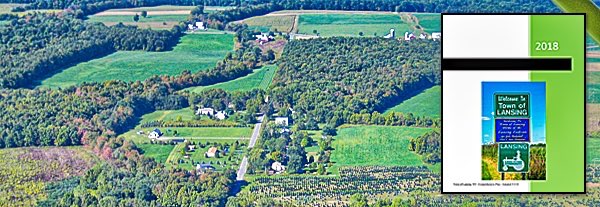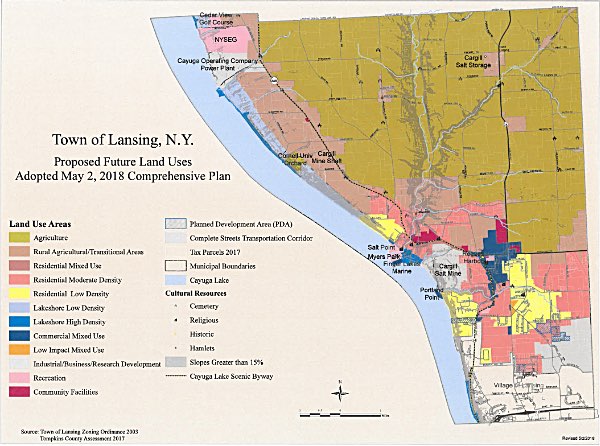- By Dan Veaner
- News
 Print
Print 
| The adopted Lansing Comprehensive Plan revision and all accompanying documents are available at the Lansing Town Hall and on the Town Web site. | ||
"Probably the biggest reason you do a comprehensive plan is so you can update your land use (zoning) ordinance," says Lansing planning Consultant Michael H. Long. "That's probably the next big step in terms of the Town of Lansing."
After about 50 authors, at least six years, two committees, two planners, a Planning Board and then a Town Board review, the 93 page document, whittled down from about 200 pages the committee sent to the Planning Board, is not significantly different in content from the 2006 revision. While the new revision is more readable, and updates terminology and new regulations, Long says the most significant change actual came from the Agriculture and Farmland Protection Plan that the Town Board adopted last year, and the Comprehensive Plan envelops as a major element.
"The concept there is to create a split zone between the rural agricultural zone that we have currently, and adding a new agricultural zone which will define a little more stringently what type of agricultural uses are in that area," Long says. "That's mostly the area that's farmed within the Town. There are large farms, small farms, organic farms, roadside sales, and different types of activities. The Ag Plan was to get a handle on some of that."
Creating an AG zone plus a few much smaller low impact, mixed use zones, most likely on North Triphammer Road, opposite Michaleen's Florist, and along the corridor by the schools will likely be the first order of business, now that the Comprehensive Plan has been put to bed. But just because they are mentioned in the plan doesn't mean they will become law.
 The light brown area on the revised Future Land Use map shows a possible new Agriculture zone. If implemented, more restrictive uses will be imposed than in the current RA zones, with the goal of preserving agriculture in the Town of Lansing, which has deep historical roots as a rural, agricultural community.
The light brown area on the revised Future Land Use map shows a possible new Agriculture zone. If implemented, more restrictive uses will be imposed than in the current RA zones, with the goal of preserving agriculture in the Town of Lansing, which has deep historical roots as a rural, agricultural community.Typically planning boards take the lead on determining what changes, if any, should be made to zoning. Assuming the Town Board gives the Planning Board that mandate, they will consider specifics as to exactly which land should be rezoned, and what uses will be allowed in the new zones. Residents will have ample opportunity to weigh in during the proceedings, and even if they disagree with the recommendations in the Comprehensive Plan their comments will be considered while the new zoning laws are being crafted. Long says the the Ag Committee will also likely have a strong voice in the formation of an AG zone, which could cover the majority of properties in the north portion of the Town.
As with any public meeting time is allotted at Planning Board meetings, all of which are open to the public, for citizen input. Long says the Lansing board would likely hold an official public hearing as well before passing its recommendation to the Town Board.
"It's typical for planning boards to take on that role," Long says. "I'm sure they'd ask for public comment. I'm certain that they would probably schedule public hearings to try to get official comments. They have the option to do that. The Town Board would be required to hold a public hearing before passing any changes into law."
Long says he hopes this work will begin right away. But he says the amount of time it takes to get this work done will depend of how much of the zoning is to be reviewed.
"It depends on what you're changing," he says. "The next conversation we're going to need to have is 'do we start over from scratch? Or do we just tweak what we have?' (Town Attorney Guy Krogh) has suggested we should do a major overhaul, because the terminology and some of the definitions have changed. I don't think we'll throw it out and start all over again. The comprehensive plan that the Town Board adopted doesn't make too dramatic changes. The Ag zone is the major thing that was changed, and I think everybody's agreed that that's appropriate. Now it comes down to defining exactly which line is where."
Long says that it makes sense for the Planning Board to take the lead in crafting zoning changes, because they are the Board through which all proposed developments are funneled before they can be approved for permitting. Board members' considerable experience informs decisions on sensible zoning that they will then be the ones to put into practice.
"They're usually the first line of defense when it comes to submitting plans," Long says. "One of the permitted uses in the RA zone now is hospitals. Is that the best place to put a hospital? Out in the agricultural zone? Probably not, because you don't have water, sewer, electric, gas, things of that nature. So we want to move those things into areas that have a little more density and more existing infrastructure, on major roads and things of that nature."
Long says another key purpose of comprehensive plans is to provide support for grant applications. Applications that further the goals of an adopted comprehensive plan make a stronger case for bringing grant money to a municipality.
Long says, "One of the components is a structural concept of a capital improvement plan, which allows us to apply for different grants in the future."
The first application Lansing is submitting is for a potential $500,000 grant that would be used to make improvements to Myers Park (see next week's Lansing Star for details on this plan). The Town ticked all the boxes the State looks for in awarding grants, but with the comprehensive plan in limbo, Lansing was knocked out of the running last year. One of the main motivators for town officials this year was to get a plan revision approved was to have it in place before the application deadline.
"Among the most important powers and duties granted by the legislature to a town government is the authority and responsibility to undertake town comprehensive planning and to regulate land use for the purpose of protecting the public health, safety and general welfare of its citizens," says an introduction to New York State Town Law governing comprehensive plans.
The Planning Board posts meeting times and agendas on the Town Web site. Anyone with an interest in following or weighing in on new zoning may attend these meetings.
v14i20



